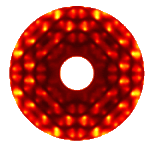Interactive example : Results

Basic examples
Single atom
Pair of atoms
Row of atoms
Interactive examples
1D crystal builder
Polygons of atoms
Different atoms
Ewald sphere
Units
Interference
Bragg's law
Goto
Contents
- As you increase the unit length, the coordinates of the atoms decrease and vice versa.
- Given the unit lengths of 5 and 8 Ångstroems, respectively, the coordinates of all atoms are exact integer numbers. The periodicity of this crystal is 5 Ångstroem along the x and 8 Ångstroem along the y axis. One would refer to these values as the unit cell constants of the material.
Example reciprocal space:
- As you increase the unit length, the coordinates of the Bragg reflections decrease and vice versa. The measurement in reciprocal space, however, is in 1/Ångstroem !
- The values of 0.2 and 0.125 A-1 along the x and y axis, respectively, yield integer coordinates for all Bragg reflections. Incidentally, these values are the reciprocal values to the lattice constants of the Example A. This simple relationship, however, is only valid in rectangular lattices, as you will see later on.
- The unit lengths of h are 0.2 and 0.125 Å-1
- The unit lengths of Q is 6.28 Å-1.
When you describe periodic structures and their reciprocal space, the unit h is definetely better suited. For non-periodic structures like glasses the difference is more a matter of taste and willingness to carry around an extra 2π..